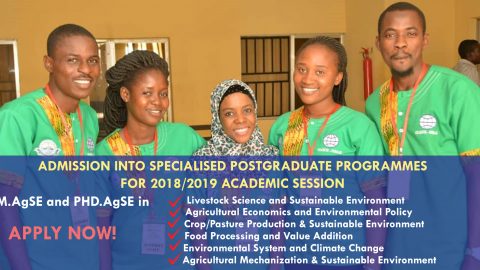Topic :
The effect of dietary supplementation of riboflavin and/or protease enzyme on oxidative stress and immunology in broiler Turkey
Name: Ashawe-Esan Adebisi
PG Number: PG/13/0794
Admission year: 2014/2015 session
Date of defense: 30th October 2017
Degree awarded: M.AgSE
ABSTRACT
One of the most effective ways to improve the immune system and reduce oxidative stress is through supplementation of natural ingredients such as protease and riboflavin. The study evaluated the effects of dietary supplementation with riboflavin and/or protease enzyme on oxidative stress and immunological parameters of British United Turkeys (BUT) raised in humid tropics. Eighty (80) Broiler turkeys of similar weight initially raised for 8 weeks were randomly allotted to 4 treatments of 4 replicates with 5 birds per replicate. The treatments consists of turkeys fed basal diet (T1) as control, basal diet+6mg riboflavin (T2), basal diet + 1000mg protease enzymes (PRO) as T3 and basal diet + 6mg riboflavin+1000mg Protease enzyme (PRO+riboflavin) as T4. Data collected between 10 (grower phase) and 16 weeks (finisher phase) of age were subjected to one-way Analysis of Variance. Growth performance, rectal temperature, pulse rate, haematological parameters, serum biochemistry, total antioxidant capacity (SOD, CAT, GPx), malondialdehyde (MDA) concentrations, arginase activities, immunology parameters (haemagglutination and leukocyte differentials) were evaluated. Dietary treatments had significant (p<0.05) effects on feed intake, feed conversion ratio and cost of feed per bird at grower (G) and finisher (F) phases. Turkeys fed diet supplemented with riboflavin had the highest feed intake and FCR while diet containing PRO+riboflavin had the least feed intake and FCR at G and F phases. WBC and WBC differentials were significantly (p<0.05) influenced at the G phase. The WBC and WBC differentials of turkey fed diet supplemented with PRO+riboflavin were significantly improved (p<0.05). While at F phase PCV, Hb and MCV (39.75%, 13.36g/dl and 95.74 pg) values in turkey fed PRO were significantly (p<0.05) better. However, there was no significant different among serum parameters at G phase except for Total cholesterol and ALT. At F phase TP, ALT, albumin, globulin, uric acid and glucose were significantly higher in diet containing PRO+riboflavin. Elevated MDA concentration in serum of turkey fed PRO+riboflavin was observed at G and F phases. Riboflavin decreased MDA at G phase and PRO decreased MDA at F phase. The results of arginase, pulse rate, and rectal temperature at G and F phases were not significantly (p>0.05) influenced by dietary treatments. Haemagglutination potentials and total antioxidant capacity (SOD, GPx, CAT) were not significantly affected at G and F phases, except GPx that was significantly (p<0.05) influenced at F phase in PRO diet. At F phase, there was agglutination across the dietary treatments, with the best value recorded at 60 min in turkey diet supplemented with PRO. The study concluded that protease enzyme and riboflavin play important role in growth performance, immunology, haematology and total antioxidant capacity of Broiler turkeys.
